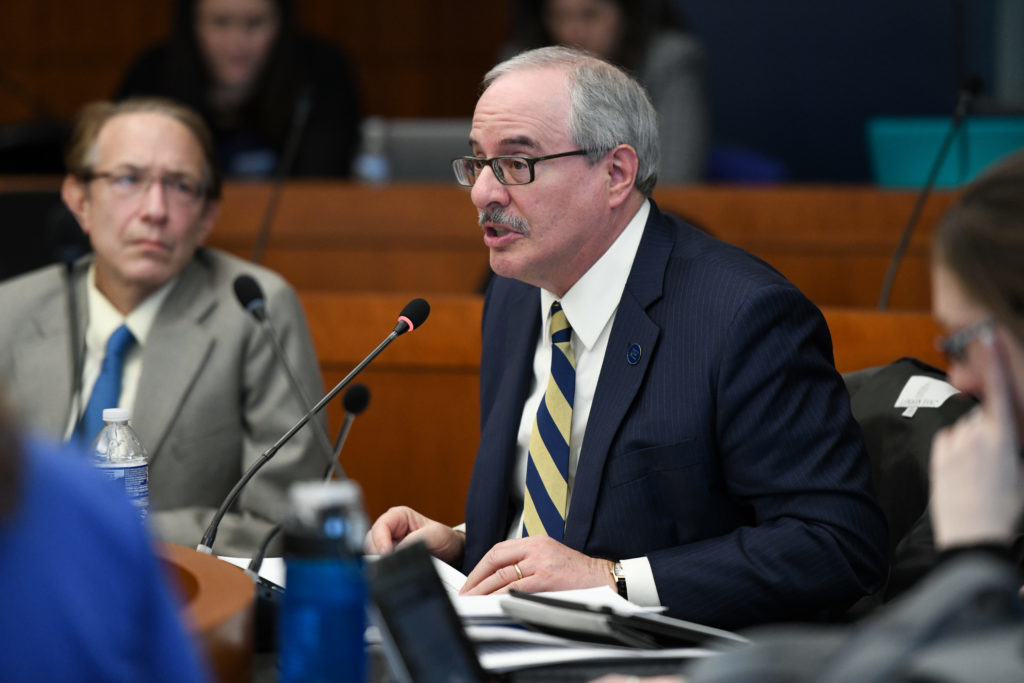Congress is considering a proposal to require university presidents to review all sexual misconduct claims made against employees on their campuses.
The bill, a bipartisan proposal introduced Feb. 15, would mandate that university presidents review all employee sexual misconduct claims reported to the Title IX office within a year after they are filed. Title IX experts said the review process could boost administrative accountability, but university presidents may not have the proper training to know how to handle those cases.
The bill would require colleges that receive federal funding to submit annual reports to the secretary of education stating that the school’s president and one member of the Board of Trustees have reviewed all reported employee sexual misconduct claims.
The bill was drafted in response to high-profile incidents of campus sexual abuse, like Larry Nassar at Michigan State University and Jerry Sandusky at Pennsylvania State University. The two men both continued serially abusing athletes and children despite repeated warning signs about their behavior.
Senators who introduced the bill said it would prevent university presidents from claiming they had no knowledge of sexual misconduct allegations, as the leaders of both MSU and Penn State claimed, according to The Chronicle of Higher Education.
University spokeswoman Maralee Csellar said the University “continually monitors” discussions, proposals and bills being considered on Capitol Hill, and that GW has specific guidelines and procedures for students and employees to follow if they encounter sexual misconduct.
“The University is committed to the safety and well-being of all members of its community and will not tolerate sexual misconduct of any kind by any student, staff or faculty member,” Csellar said in an email.
Csellar declined to say how the Title IX office would work with University President Thomas LeBlanc if the bill is passed and how current University policy might be altered to comply with the law. She also declined to say whether GW supports the bill.
The University is currently under federal Title IX investigation for possible mishandling of a sexual violence case. Officials are also conducting an internal review of Title IX policies.
While the bill could increase accountability on campus, experts said administrators need to acknowledge that they lack the specific training typically required to handle these types of complaints.
Carly Mee, a staff attorney for SurvJustice, a nonprofit offering legal assistance to survivors, said it’s helpful to have an administrator as high up as the president address any potential harassment or abuse, but often they lack the proper training to effectively evaluate a misconduct claim. She said the bill should require university presidents to undergo that training.
“We have seen in instances where cases go up college presidents and they don’t have the proper training and they overturn cases without a proper basis,” Mee said. “They just intervene and say that students shouldn’t be punished because they don’t understand the definitions, they don’t understand the standards that students are held to.”
But Mee said the bill might benefit sexual assault prevention efforts because university presidents typically have control over funding for resources like prevention programming, support for students reporting an incident and counseling services. She said if a university president is required to review every case of sexual misconduct, it might make university leadership more aware of sexual assault issues and more likely to approve funding increases.
“If they’re going to have presidents review this so that they can’t say, ‘I didn’t know it was a problem,’ then it needs to be a joint effort with the people who are tackling this on the ground every day and that would be the Title IX office,” she said.
Alec Rose, an attorney and certified criminal law specialist, said the bill will ultimately allow top-level officials to be held accountable if abuse is reported and still not stopped.
“The president of the Penn State was allowed to just say he didn’t know, and so he was off the hook,” he said. “He ultimately wound up resigning over it anyway, but if somebody could get away with just saying, ‘well I never knew,’ then they get away with it.”
Matthew Ornstein, the co-director of legal programs at Network for Victim Recovery of D.C., said by having a high-ranking official review all sexual misconduct claims, survivors may be more likely to report if they felt that a university would take their case seriously and handle it appropriately.
“When people make the decision to come forward, they’re doing that on the belief that coming forward is meaningful, that it will be looked at appropriately and taken seriously and not be ignored and treated in a disrespectful way,” he said.





